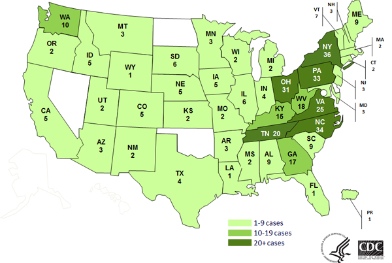The CDC says that the multistate outbreak of human Salmonella infections linked to live poultry in backyard flocks appears to be over. However, consumers should take steps to protect themselves from this pathogenic bacteria if they choose to keep chickens, ducks, and turkey. Mt. Healthy Hatcheries in Ohio was the source of chicks and ducklings, as determined by multiple traceback investigations. This is the same mail-order hatchery that has been associated with multiple outbreaks of Salmonella infections linked to live poultry in 2012 and 2013.
A total of 363 people in 43 states and Puerto Rico were infected with outbreak strains of Salmonella Infantis, Salmonella Newport, or Salmonella Hadar. Thirty-three percent of ill persons were hospitalized. No deaths were reported.

The case count by state is as follows: Alabama (9), Arizona (3), Arkansas (3), California (5), Colorado (5), Connecticut (2), Florida (1), Georgia (17), Idaho (5), Illinois (6), Iowa (5), Indiana (4), Kansas (2), Kentucky (15), Louisiana (1), Maine (9), Maryland (3), Massachusetts (2), Michigan (2), Minnesota (3), Mississippi (2), Missouri (2), Montana (3), Nebraska (5), New Hampshire (3), New Jersey (3), New Mexico (2), New York (36), North Carolina (34), Ohio (31), Oregon (2), Pennsylvania (33), Puerto Rico (1), South Carolina (9), South Dakota (6), Tennessee (20), Texas (4), Utah (2), Vermont (7), Virginia (25), Washington (10), West Virginia (18), Wisconsin (2), and Wyoming (1). Illnesses began between February 3 and September 27, 2014. Ill persons ranged in age from younger than 1 year to 95 years. Thirty-five percent of ill persons were 10 years old or younger, and 55% of ill persons were female.
The symptoms of a Salmonella infection include nausea, vomiting, diarrhea that may be bloody, abdominal pain, fever, chills, headache, and muscle pain. Long term complications of a Salmonella infection can be serious, including reactive arthritis, eye irritation, irritable bowel syndrome, aneurysm, myocarditis, and meningitis.
It’s important that anyone who chooses to keep live poultry wash their hands after handling the birds, their bedding, and their feed. Never let small children kiss birds, and make sure they don’t put their fingers in their mouths after touching the animals, their bedding, or anything in the animal area. Wash hands thoroughly with soap and water right after touching live birds or anything in the area where they live. Don’t let children younger than five years of age handle live poultry. And don’t let live poultry live inside the house, especially where food is prepared or eaten.




